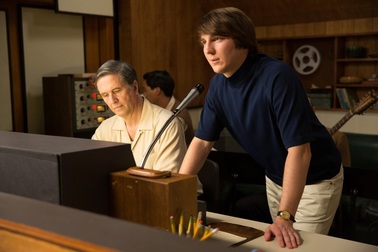
Musician biopics have been savaged by Walk Hard, such that it's difficult to watch one without thinking back to Dewey Cox's journey from machete fight survivor to celebrated musical icon. Love and Mercy, about Beach Boys' mastermind Brian Wilson, very easily could've gone down that path, as Wilson has a life well-suited to the highs and lows of a very predictable film. Instead, Bill Pohlad's film captures the one thing so few similar films do; the actual process of transforming inspiration into a record. There are no hackneyed scenes of a serendipitous eureka moment, as the camera slowly dollys into a character'f face. Love and Mercy puts in the time to show how music is actually made, and combined with Wilson's stranger-than-fiction life, it leaves the lazier, alternative film it might've been far behind.
Taking a page from recent biopics like Lincoln and Selma, Love and Mercy picks two events from Wilson's life and builds itself around them. As a young man trying to keep his band in competition with the ascendant Beatles, Wilson (Paul Dano) composes the album Pet Sounds single-handedly while his band-mates are on tour in Japan. Following its critical success but commercial failure, a chastised Wilson experiences an exacerbation of existing mental issues, culminating in becoming bed-ridden and near-comatose. As a middle-aged man many years later, a recovered Wilson (now played by John Cusack) strikes up a tentative relationship with Melinda Ledbetter (Elizabeth Banks) but is thwarted by his tyrannical legal guardian Eugene Landy (Paul Giamatti). Pohlad cuts back and forth between the older and younger Wilson, tracking both versions' dissolution.
Minimal knowledge about Wilson and the Beach Boys accompanied me into Love and Mercy. An opening-credits montage of their surf-rock, white-bread, wholesome success led me to expect a very different film, perhaps something about darkness lurking underneath the all-American image the band put out to the world. I was pleasantly surprised to learn that Wilson is praised as a genius, and Pet Sounds is regarded as one of the best albums ever made. With the ecstatic depiction of its recording, it's not a difficult lesson to learn. The greatest amount of time is spent on composing God Only Knows, a beautiful song I honestly didn't know belonged to the Beach Boys. Dano is irrepressible in these scenes, bringing in all manner of instruments and barnyard animals into the recording studio and scampering from musician to musician, giving persistent but clear instructions. He's trying desperately to pull the melody out of his head, which Pohlad designs as a cacophony with the barest semblance of a melody undergirding it. It's the clearest depiction of writing music I can recall seeing on film, making a skill that I do not possess seem knowable in an abstract way.
Juxtaposing the energetic young Wilson with the lethargic, medicated, older Wilson is another striking depiction of another quality, though this one is thankfully unpossessed. The toll that mental illness has taken on Wilson in the decades between Pet Sounds and the 80's is readily apparent. Pohlad withholds details about older Wilson's mental and legal status as long as possible. One scene offers that he hasn't seen his daughters in years. Another reveals all the excuses Wilson is willing to make for Landy and Wilson's abusive father. Love and Mercy is a story about inspiration in the 60's, but in the 80's, it's a mystery and half of a kidnapping tale. As he grows closer to Ledbetter, she becomes the angel on his shoulder to Landy's devil, though the picture of Landy as petty tyrant is clouded by his success in transforming Wilson from the comatose blob that he very much used to be.
Pohlad has assembled a strong cast in service to Wilson's interesting life, none more than the actors tasked with playing the musician. As the younger Wilson, Dano is doing the best work of his career. He's able to convey Wilson's visionary status in a tactile fashion, something Love and Mercy needed to succeed. Brilliant in the studio, Dano can't quite translate those talents into leadership, as he repeatedly comes up short against his skeptical bandmates or his cruel father (Bill Camp). That mix of genius and weakness is alchemical, making the often-irritating Dano an appealing lead. Cusack has played many hyper-verbal roles in his career, but this is the exact opposite. His Wilson is tentative in all things, with Cusack's large frame melting into resignation and obedience. Genuinely afraid of Landy, Cusack sells his deep terror. As the person most likely to free him from Landy, Banks is a capable ally. On the receiving end of Landy's threats and grandstanding, she has plenty of steel and gravitas to withstand them and give some back. Giamatti, with some subpar wig work, is the weak link amongst the main actors, chewing much of the scenery in frequent outbursts.
For all its admirable focus on Pet Sounds and the Ledbetter romance, Love and Mercy can't completely shed its genre trappings. The decay of young Wilson towards his comatose state doesn't break new ground like the recording sessions do, and even in those sessions, Pohlad can't keep himself from including a scene in which a musician tells Wilson he's a genius. That doesn't need stating. That Love and Mercy so plainly made that clear to someone who had dismissed the Beach Boys as a clean-cut proto-boy band is an impressive and pleasant surprise. B+
 RSS Feed
RSS Feed